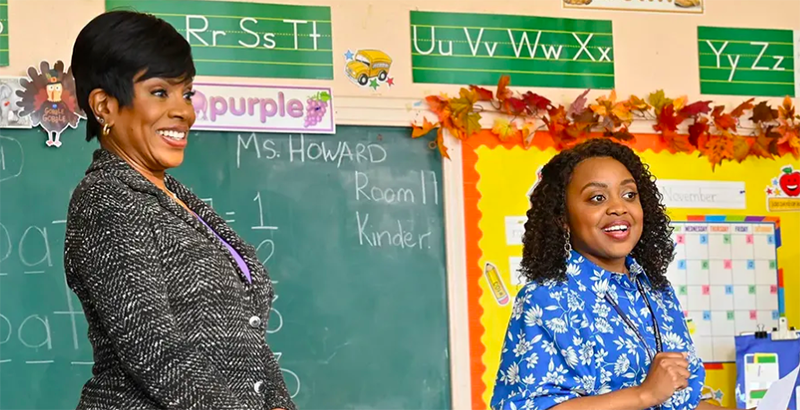We Need Black Teachers and the Breakout Hit Sitcom ‘Abbott Elementary’ Shows Us Why

Get stories like these delivered straight to your inbox. Sign up for The 74 Newsletter
At a critical time when the U.S. education sector is facing high teacher attrition rates fueled by the pandemic and a stream of legislative restrictions around classroom content and teaching methods, the new and much-loved Abbott Elementary tells a more nuanced story of how a group of passionate, tenacious educators navigate their school system to improve student outcomes.
This heartwarming show takes a comedic, mockumentary approach in tackling some of the most pressing issues around urban education: inadequate school funding, teacher turnover and the misappropriation of school funds. However, one other major theme also stands out for me: the positive impact of Black educators.
Part of what makes ABC’s Abbott Elementary refreshing and unique is the fact that this majority-Black school is comprised of a mostly Black staff. From the school leader to the janitor, the default in this West Philadelphia school community is Blackness. But, this narrative is far from the norm for many of our nation’s students as they navigate their 13- year public school experience. In fact, the reality is that while Black students make up 15 percent of the nation’s public education system, only 7 percent of our educator workforce identifies as Black. At just under 2 percent, the share of Black male educators is even more disheartening.
Research indicates that the presence of Black teachers in the classroom is directly linked to improved student outcomes for all students, especially Black students. For example, having at least one Black teacher early on reduces a Black student’s likelihood of dropping out of school by up to 39 percent. Additionally, when Black students have access to two Black elementary school teachers, they are 32 percent more likely to go to college.
Principal Coleman, Ms. Teagues, Mrs. Howard and Mr. Eddie demonstrate the importance of ensuring that all kids have access to educators that not only reflect their cultural background, but also share common sociopolitical interests with their students.
One of the series’s most memorable moments is when Quinta Brunson’s character, the ever-hopeful second grade teacher Janine Teagues, pays homage to the community she and her students grew up in by teaching a lesson on the use of Philly slang — from “jawn” [basically a substitute noun for any people, place or thing] to “oldhead,” [someone older or whose generation came before].
It’s no wonder that the Philadelphia City Council recently passed a resolution to celebrate the show for spotlighting the many joys and challenges of working as an educator in Philadelphia’s school system.
While the teaching profession has been neglected for so long, this feel-good show beautifully highlights the profound impact teachers, specifically Black teachers, have on their students and their communities. My time spent in the classrooms of Gates Elementary in San Antonio, Texas illuminated some of the same support and tension that the teachers in Abbott Elementary grapple with. Starting a school garden with one of my co-workers, disregarding my own self-care on some days, and being mentored by one of the amazing veteran teachers on campus are just a few of the many shared experiences. I saw a lot of myself in this show, which was both triggering and affirming if I must confess.
As the wise kindergarten teacher Barbara Howard, played by Sheryl Lee Ralph, tells her colleagues: “Teachers at a school like Abbott, we have to be able to do it all. We are admin, we are social workers, we are therapists, we are second parents. Hell, sometimes we are even first. Why? Cuz it sure ain’t the money. … Want to know my secret? Do everything you can for your kids.”
Abbott Elementary is truly the gift that keeps on giving and I hope that we can continue to give Brunson, the show’s creator, producer and star, her flowers for uplifting the narrative around the profound and long-lasting impact that Black educators have on their students. Black teachers, like Brunson’s mother or the namesake of the show, her sixth grade teacher Ms. Abbott, went to great lengths to meet their students where they’re at, while challenging them to reach their highest potential. That’s why we need more of them.
At the Center for Black Educator Development, we’re partnering with local and national organizations to create a movement around education as a form of activism through the launch of our #WeNeedBlackTeachers national campaign. The goal is to raise awareness around the shortage of Black teachers, with hopes of inspiring a new generation of leaders to answer the call to become a changemaker in the classroom. Learn more about the campaign here.
During their reunion on Jimmy Kimmel Live, Joyce Abbott recalled her former student, the gifts she brought to class and those she needed a little help in realizing.
“Quinta was an awesome student. When she came into my class, she was really shy, timid. But as I challenged all of my students — we had to speak in complete sentences — I built their confidence that whatever you want in life, you can do it.”
What a special thing it is for Black educators to challenge their students academically, while simultaneously making them feel seen and encouraging them to pursue their dreams. Ms. Abbott, Ms. Teagues, Mrs. Howard and Mr. Eddie all prove to us that Black teachers do more than just provide a strong education — they empower their students.
Mimi Woldeyohannes is director of strategic partnerships at the Center for Black Educator Development. She is the former special projects and community manager at The 74.
Get stories like these delivered straight to your inbox. Sign up for The 74 Newsletter


